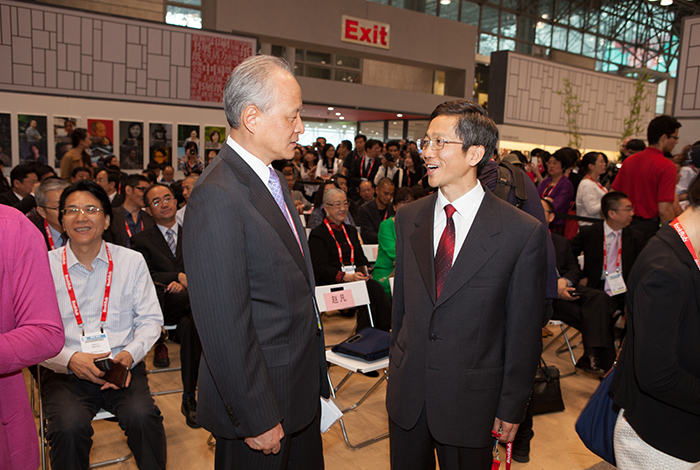This year, two strikingly opposed vistas marked Book Expo America, the largest annual book industry trade show.
Shiny black stretch limos deposited representatives of dozens of Chinese publishing houses onto the sidewalk of the cavernous Javits Convention Center, where Ambassador Cui Tiankai, China’s lead representative to the United States, joined a 500-member delegation spread across almost 25,000 feet of floor space. Amid bamboo and soft light, 10,000 books were featured, and 26 prominent authors from the mainland flew halfway around the globe to attend. Another 50 events highlighting Chinese literature—readings, films, panels—were sprinkled around Manhattan.
But on the steps of the New York Public Library, protestors gathered to lift up placards demanding “Free Expression”—a challenge to widespread censorship in China. Novelists Ha Jin and Murong Xuecun spoke publicly of their dismay, standing alongside American writers Jonathan Franzen, A. M. Homes and Paul Auster.
The protest, organized by PEN America, noted the widespread censorship within China, often suppressing writing on gay rights, repressed Chinese minorities, Tibet and the Tiananmen Square massacre. Andrew Solomon, president of PEN America, had a bruising experience of the translation of The Noonday Demon, his landmark book on depression.
Without his knowledge, all references to Solomon being gay were deleted, gutting the book of its raison d’etre and infuriating the writer. (He won an Anisfield-Wolf award in 2013 for Far From the Tree.)
“I think there’s a suggestion that because China is an enormous market, we have to defer to the Chinese internal standards of censorship,” Solomon told the New York Times. “It’s somewhere between naïve and hypocritical to engage with China and not acknowledge the severity of this problem.”
The marketplace is huge – China is adding 20 million English readers a year, the Times reported. And the Chinese book industry has expanded into an $8 billion annual business, second only to the one in the United States. Steve Rosato, event director for Book Expo, called the Chinese presence at his trade show a watershed: “We’re going to remember this for a generation, because it’s going to be the beginning of opening some doors.”
After Book Expo concluded, Ha Jin, who has been barred from returning to China, gave an interview to the Asian American Writers Workshop, focused on his new novel, A Map of Betrayal. And the tensions around censorship shifted to the Chinese governments’ attempts to filter and control coverage of the capsized cruise ship on the Yangtze River, where perhaps 400 passengers are feared dead.
